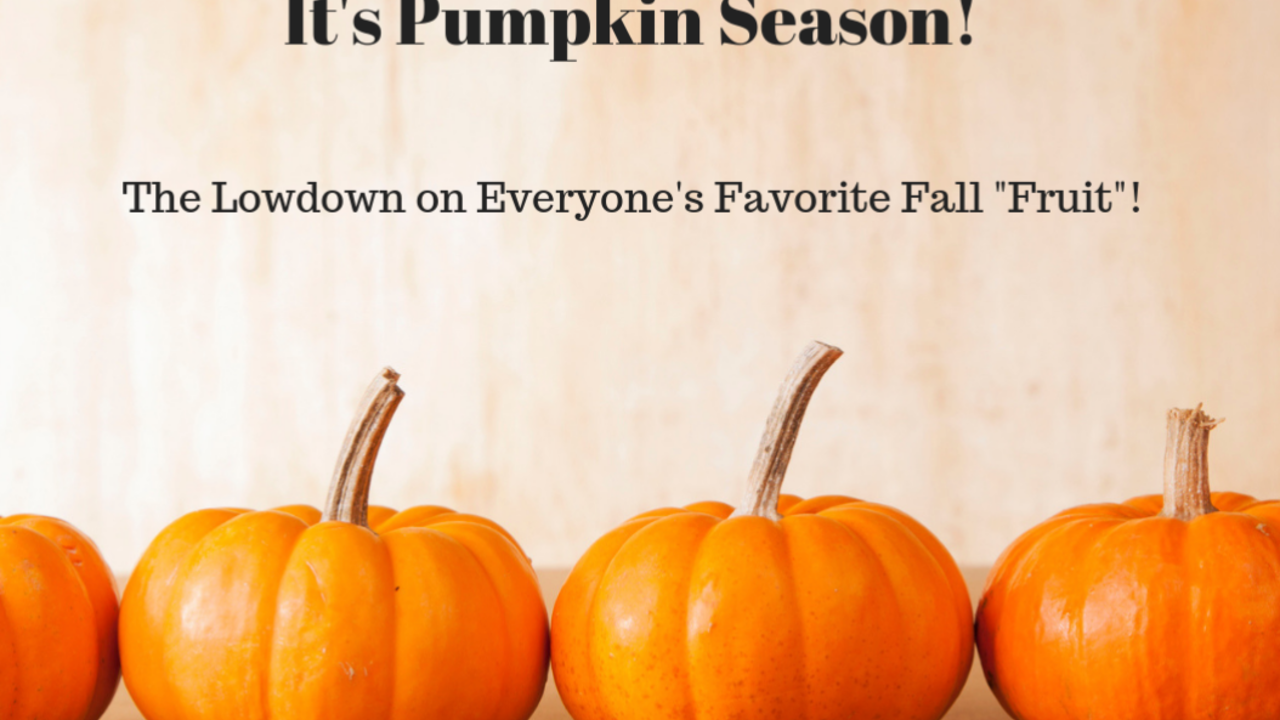It's Pumpkin Season! The Lowdown on Everyone's Favorite Fall "Fruit"!

FALL IS HERE, and with fall comes PUMPKINS! You might be familiar with carving these big bright orange gems during the fall season into a multitude of decorative designs and faces, but what if I told you that THEY could carve YOU into a healthier version of yourself? Whether it’s Charlie Brown’s Great Pumpkin, a festive pumpkin pie, or a Starbucks Pumpkin Spiced Latte – Pumpkins are American Fall Icons and have long been associated with holidays such as Halloween and Thanksgiving. Pumpkins are indigenous to North America and were one of the first wild plants to be harvested for nutritional consumption* – making these gourds not only icons but culinary founding fathers. Pumpkins are very popular and for a good reason: they are a powerhouse of nutrition, fiber and antioxidants which serve as the ingredients to a happier, healthier you!
1. Delicious and Nutritious! Pumpkins not only fill us with festive fall fun but are also packed with nutritional value. 100g (grams) of this festive fruit (that’s right – pumpkin is technically considered a fruit) provide just 26 calories and is a rich source of vitamins and minerals*. If you are looking for something more filling, just look to pumpkin seeds which provide 559 calories per 100g, 30 g of protein, 110% RDA of iron, 4987 mg of niacin (31% RDA), selenium (17% of RDA), zinc (71%), but zero cholesterol!
2. Packed with Fiber Power! Aside from being a nutritiously dense low calorie food, pumpkins also have to potential to help you reach your fall weight goals since they are very high in Fiber! Fresh pumpkin comes packed with about 3 g of fiber, pumpkin seeds have 5.2 g of fiber and canned pumpkins have 7 grams per ounce. The higher the fiber content of the food the more satisfied you will feel causing you to eat less. High fiber diets have been associated with decreased risk of heart disease, hypertension, some gastrointestinal diseases, stroke, and diabetes*. Fiber slows the rate of sugar absorption in our bodies and promotes regular digestive activity decreasing the risk of colon cancer.
3. Pumpkin’s Antioxidants – The Fountain of Youth? Pumpkins are the best source of Beta Carotene which is what gives the fruit it’s bright orange color and serves as a precursor for Vitamin A. 100g of Pumpkin already come loaded with 7,384 mg of Vitamin A which is 246% of RDA* but Beta Carotene gives the body the ability to synthesize Vitamin A when it is needed and serves as a potent antioxidant. Vitamin A mainly works to maintain our eye and skin health but also triggers the production of white blood cells in the body which fight infection. Pumpkins also contain an antioxidant named Zeaxanthin, which further protects our eyes from age related degeneration by filtering UV rays. The antioxidant power of fall’s favorite fruit also keeps our minds young and protects from cognitive decline that occurs over time*.
BUT not all pumpkin products are created equal:
• Although canned pumpkin is high in fiber, it can also be high in added sugars – fresh cooked/steamed/boiled pumpkin can be used instead
• Avoid using pumpkin pie mixes or artificial pumpkin flavorings as they are very high is added sugars and sweeteners • A great substitute for butter or oil when baking is pumpkin puree
• Large “Halloween” pumpkins are not the best to use for baking recipes as they are not as naturally sweet as the smaller pumpkin variety
• Avoid overly enjoying artificially pumpkin flavored products such as pop tarts, chips, or the beloved pumpkin spiced latte as they are enriched with sugars and flavorings.


